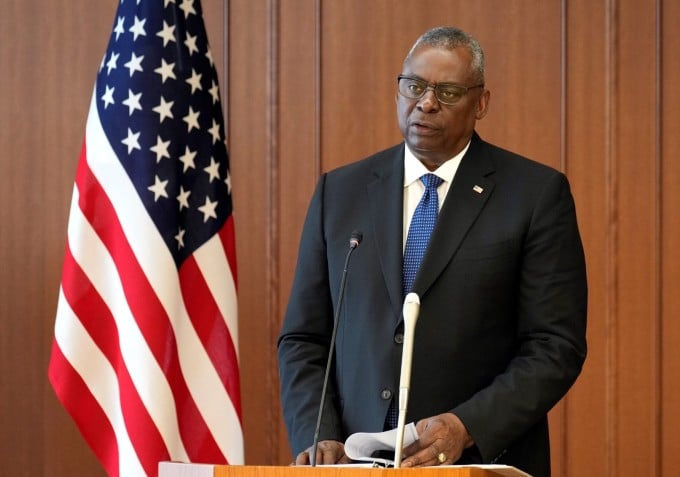US Defense Secretary Austin was hospitalized but did not report it, causing President Biden to face a lot of pressure from Republicans about his ability to govern.
The Biden administration is facing criticism from Republicans and the public at home after US Defense Secretary Lloyd Austin admitted that he did not provide timely information about his one-week hospitalization.
The Pentagon confirmed on January 5 that Secretary Austin, 70, had suffered “complications following a recent elective medical procedure” and had been admitted to Walter Reed National Military Medical Center for treatment since January 1. But the trouble didn’t stop there as the Pentagon waited five days after the incident to release limited and vague information about Austin’s health.
Information released by the US media shows that Mr. Austin and his assistants did not immediately report the incident to the White House and Congress, even though he may have to undergo anesthesia during treatment and lose the ability to lead the Department of Defense for a short time.
Even Deputy Secretary of Defense Kathy Hicks, who is assigned some of the Pentagon's operational responsibilities, did not know for two days that her superior was hospitalized. The incident threatened to damage the reputation of both the White House and the Pentagon, when the entire administration was unaware that the head of the Department of Defense "disappeared" amid complicated security developments.
Republican Senator Tom Cotton said Mr Austin needed to "quickly clarify" why he and his team did not immediately report his health status to President Biden and the National Security Council.
Chairman of the Joint Chiefs of Staff Charles Brown learned of the news on January 2, the day after Austin was hospitalized. President Biden learned of the Defense Secretary’s hospitalization on January 4, and National Security Adviser Jake Sullivan learned even later. The Pentagon did not inform Congress until January 5, 15 minutes before issuing a press release.

US Secretary of Defense Lloyd Austin at a press conference in Tokyo, Japan on June 1, 2023. Photo: AFP
Pentagon spokesman Patrick Ryder confirmed that Austin had been moved to intensive care upon arrival at Walter Reed, but did not provide details of the Defense Secretary's condition.
Republicans questioned whether Mr. Austin, while hospitalized, was at times unable to fully perform his duties as Secretary of Defense, creating a national security risk.
Secretary Austin sits directly below President Biden in the military hierarchy and is responsible for responding immediately to a national security crisis, such as a nuclear attack on the United States. The defense secretary would need to communicate with government officials over a secure line, which is nearly impossible in a hospital intensive care unit.
Congressman Cotton asked the Biden administration to specifically identify responsibility in the incident.
"The Secretary of Defense is a key link in the chain of command, connecting the president and the federal military. This position is even more important in the nuclear command system, which requires leaders to make extremely heavy decisions in a split second," he emphasized.
Roger Wicker, the top Republican on the Senate Armed Services Committee, criticized the way the US Department of Defense hid information about Mr. Austin's hospitalization, calling it an "unbelievable defiance of the law." He reiterated the Pentagon's "National Command Authority" (NCA) rule, which states that the US military only receives orders from two authorized people: the President and the Secretary of Defense.
"If either of these men is unable to perform their duties, the military, Congress and the American public have a right to know exactly what happened to them," Wicker said.
He said that Secretary Austin's incident was not the first time the Biden administration "failed to quickly inform the people about major changes in the country", before that was the incident of a Chinese balloon flying into US airspace in January 2023 and the chaotic withdrawal campaign in Afghanistan in August 2022.
“The incident further erodes trust in the Biden administration. Congress should have been informed of the incident as soon as it occurred,” Wicker said, criticizing the Pentagon’s handling of the time Mr. Austin was hospitalized.
The White House is trying to control the media crisis, as the US enters a tense presidential election year.
Secretary Austin has accepted responsibility for “what could have been done better” in his communications and pledged to learn from his experience, but he did not provide specifics on his health or when he might be discharged. A Pentagon spokesman assured that Austin had resumed all duties and responsibilities and had received full information about the military and the world situation during his stay in the hospital.
White House press secretary Karine Jean-Pierre said on January 8 that President Biden had spoken with Secretary Austin and welcomed his acceptance of full responsibility for the failure to notify him of his hospitalization. The National Security Council and the Pentagon reaffirmed that Austin would continue to serve as Secretary of Defense.

The Marine One helicopter lands in front of Walter Reed National Military Medical Center in Bethesda, Maryland in July 2021. Photo: AFP
The Washington Post, citing a source familiar with the matter, said that Mr. Austin and Mr. Biden had a "particularly close relationship." Beau Biden, the late son of the US President, worked under Mr. Austin in Iraq.
"The President and the Minister trust each other very much. This incident will not affect the relationship between the two. The President wants the Minister to continue working," the source said.
Still, the White House acknowledged that Austin's handling of the incident went against "normal expectations," according to National Security Council spokesman John Kirby. "We will review our processes and actions in this case to learn from the experience," he said, although he affirmed that President Biden still has confidence in the Pentagon leader.
The Wall Street Journal quoted a well-informed source as saying that Mr. Austin had twice prevented his subordinates from informing the White House about his health condition.
The first occurred on December 22, when he went to Walter Reed for a “non-emergency medical procedure” and spent a day in the hospital. The second occurred on January 1, when he was hospitalized for “severe pain,” which was believed to be a complication from a treatment he received nine days earlier.
Some Biden administration officials were unhappy with Austin’s secrecy about his illness and health status, according to people familiar with the matter. One unnamed official said the defense secretary made “incredible errors of judgment” in the incident, in part due to his extremely private personality and his desire to keep information about his schedule confidential.
"We always need confidentiality in the leadership position of the Department of Defense. No one wants a defense secretary who is always calling the president for advice. However, in some cases, the secretary also needs to be transparent with information. The way he handled this case was counterproductive," commented the US official.
The Pentagon Correspondents Association (PPA), which represents journalists covering the US Department of Defense, sent a letter to Assistant Secretary Chris Meagher and spokesman Patrick Ryder expressing "particular dissatisfaction" with the reporting process in the incident.
The PPA said the American public and media had a right to know about Mr Austin's hospitalization, and criticized the Pentagon's handling of the matter as "below the usual standards" for senior leaders temporarily incapacitated by surgery.
"It took the Pentagon four days from the time the Secretary was admitted to Walter Reed National Military Medical Center to notify the public, and the timing chosen for the release was late Friday night. This is reprehensible behavior," PPA stressed.
Thanh Danh (According to WP, WSJ, Fox )
Source link


![[Photo] Magical moment of double five-colored clouds on Ba Den mountain on the day of the Buddha's relic procession](https://vphoto.vietnam.vn/thumb/1200x675/vietnam/resource/IMAGE/2025/5/9/7a710556965c413397f9e38ac9708d2f)
![[Photo] General Secretary To Lam and international leaders attend the parade celebrating the 80th anniversary of the victory over fascism in Russia](https://vphoto.vietnam.vn/thumb/1200x675/vietnam/resource/IMAGE/2025/5/9/4ec77ed7629a45c79d6e8aa952f20dd3)
![[Photo] Russian military power on display at parade celebrating 80 years of victory over fascism](https://vphoto.vietnam.vn/thumb/1200x675/vietnam/resource/IMAGE/2025/5/9/ce054c3a71b74b1da3be310973aebcfd)


![[Photo] Prime Minister Pham Minh Chinh chairs a special Government meeting on the arrangement of administrative units at all levels.](https://vphoto.vietnam.vn/thumb/1200x675/vietnam/resource/IMAGE/2025/5/9/6a22e6a997424870abfb39817bb9bb6c)























































































Comment (0)